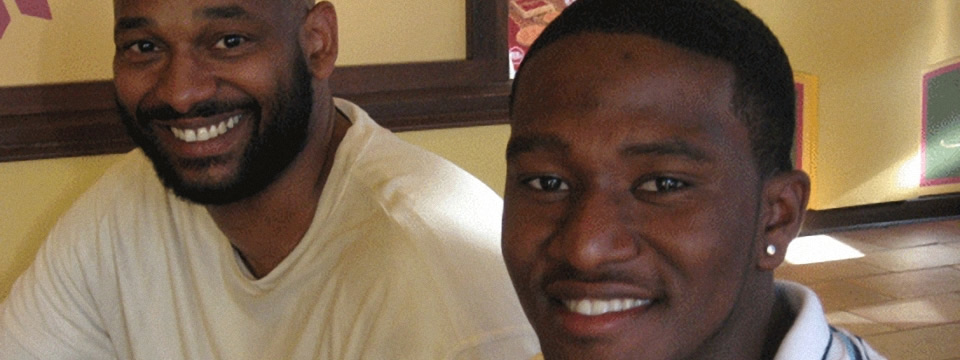★ Rising Star: A conversation with Professor Noelle Hurd
 Noelle M. Hurd, PhD, MPH is an Assistant Professor in the Department of Psychology at the University of Virginia. Over the years, I have been very impressed with Noelle’s scholarship on mentoring. And, this week, we are featuring one of Noelle’s co-authored studies (Hurd, N. M., Sánchez, B., Zimmerman, M. A., & Caldwell, C. H.) on the role of mentors in racial identity development. In this segment, UMass Boston doctoral student, Stella Kanchewa poses some interesting questions to Noelle.
Noelle M. Hurd, PhD, MPH is an Assistant Professor in the Department of Psychology at the University of Virginia. Over the years, I have been very impressed with Noelle’s scholarship on mentoring. And, this week, we are featuring one of Noelle’s co-authored studies (Hurd, N. M., Sánchez, B., Zimmerman, M. A., & Caldwell, C. H.) on the role of mentors in racial identity development. In this segment, UMass Boston doctoral student, Stella Kanchewa poses some interesting questions to Noelle.
SK: In your study, you and your team found that natural mentors encourage African-American youth’s educational attitudes and attainment by supporting racial identity development, specifically private regard, or the positive/negative perceptions youth had of their racial group and their membership within this group. What are some of the ways in which you think they do this.
NH: I think this could be happening in a number of different ways. One likely possibility is that this is happening through direct racial socialization messages that natural mentors provide to their mentees. Natural mentors may talk to youth about the many contributions African Americans have made to our society and the strength they have shown in the face of oppression and adversity. A second possibility is that natural mentors are modeling attitudes and behaviors that reflect positive attitudes toward African Americans and observing these attitudes and behaviors may influence youths’ perceptions of their racial group. Another possibility is that just the process of supporting youth may be helpful in the racial identity process that African American youth face during adolescence. Natural mentoring relationships may provide a safe context for the development of a healthy racial identity. Further, natural mentors may reflect back positive images of youth which may help them to feel more positively about themselves and this may extend to positive feelings about their racial group membership.
SK: Overall, your research focuses on the role of non-parental adults in promoting adaptive youth development. Some of your studies have focused on role models, while others have focused on natural mentors. Do you make a distinction between role models and natural mentors? If so, what do you see as the difference between those two constructs?
NH: Yes, I think the main distinction is that natural mentors have a supportive relationship with youth while role models may not have any relationship with youth. By definition, natural mentors are nonparental adults from whom youth receive support and guidance. Role models are adults to whom youth look up to and emulate. While these are separate constructs, it is possible for an adult to both be a youth’s mentor and role model.
SK: Your current work focuses on more contextual factors such as neighborhoods/communities in affecting youth’s developmental trajectories – what are some aspects of these contexts that may facilitate or hinder the development of natural mentoring networks?
NH: This has been a growing interest of mine because I think it is critical to acknowledge that natural mentoring relationships do not occur in a vacuum. Just as formal mentoring research has increasingly focused on programmatic factors that may contribute to strong matches and shape the effectiveness of these relationships in promoting more positive outcomes, there is a need to understand how environmental factors influence the development and strength of natural mentoring relationships. Recently, I have considered neighborhood demographics such as the unemployment rate, residential stability, and neighborhood racial composition. It seems that greater unemployment and concentrated poverty at the neighborhood-level may be detrimental to the formation of natural mentoring networks, yet greater residential stability and a greater representation of people who share youths’ racial background in their neighborhood (for African American youth, at least) may facilitate the development of natural mentoring networks.
SK: Any influential natural mentors in your life?
NH: Yes, this is definitely a case of research being “me-search.” What has been most striking to me has been the need for these relationships at many different stages of my life course and the critical role that my academic natural mentors (Ann Eisenberg, Marc Zimmerman, and Rob Sellers) have played in my scholarly and personal growth over the past decade. These personal experiences are consistent with findings of one of our recent studies on natural mentoring (currently under review) that suggest that natural mentoring relationships developed in emerging adulthood have the potential to positively affect adult outcomes at levels comparable to those from more long-standing natural mentoring relationships formed in early adolescence.
A few questions from Jean Rhodes
JR: Do you see any implications of your findings for formal mentoring programs/training of mentors?
NH: I have been very careful to not extrapolate the findings from my research on natural mentoring relationships to formal mentoring relationships because I do feel that these relationships differ in substantial ways. That being said, I do think that the notion of a relationship-based intervention is consistent across these relationships (in the case of natural mentoring relationships, this intervention develops naturally) and that some of the recent work I have done focusing on the role of relationship characteristics and potential pathways through which these relationships may affect youth development could have relevance for formal mentoring programs. My findings related to racial identity discussed above, for example, may suggest that efforts to promote a healthy racial identity among their mentees could be a beneficial strategy for formal mentors. Research that evaluates whether formal mentors are engaging in racial socialization practices with their mentees and what outcomes are associated with those practices would be most informative as I wonder whether it is possible that the way these racial socialization interactions play out varies substantially between natural vs. formal mentoring relationships (but within group variation is likely just as important).
JR: Do you think that these identity changes can occur in cross-race matches? If not, what are the implications for programs?
NH: Yes, I do think cross-race matches can and probably do contribute to racial identity changes. In our study, we did not have data on the race of the natural mentor. Though many of the natural mentors were extended family members, it is possible that a number of natural mentors in our study did not share youths’ race. This may partly explain why we found associations between having a natural mentoring relationship and more positive public regard (beliefs about how others outside of one’s racial group perceive one’s racial group). In addition, not sharing a mentee’s race would not prevent the mentor from supporting the development of a healthy racial identity or engaging in conversations with mentees about the strength, courage, and resilience of African Americans. It certainly seems possible that training all mentors, particularly mentors in cross-race matches, to understand the importance of racial/ethnic identity development among youth of color and the role they may be able to play in supporting that healthy development could be a valuable strategy to promote stronger relationships and more positive youth outcomes.










